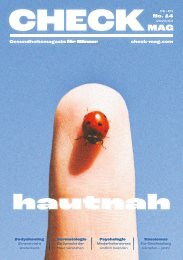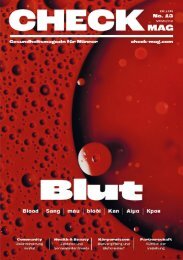CHECK Magazin - Gesundheitsmagazin für Männer No.15
Auf die wissenschaftlich nicht unbegründete Angst, dass der Planet Erde irgendwann für Menschen nicht mehr bewohnbar ist, reagieren die einen mit Widerstand, die anderen mit Ignoranz. Eine null Zukunft steht im Raum, dabei geht das Leben auf jeden Fall weiter. Nach dem Tod kompostieren wir und landen — über viele lange Umwege — vielleicht auf einem Salatteller, den eine (Leih-)Mutter während ihrer Schwangerschaft ißt. Der Punkt ist, dass hier niemand wirklich rauskommt. Warum also gestalten wir uns und den anderen die kurze Zeit nicht so angenehm und gesund wie möglich? Wir haben daher auf eine Sache geschaut, die wir alle gemeinsam haben: Wir altern, hoffentlich mit null Gewalt und Emissionen.
Auf die wissenschaftlich nicht unbegründete Angst, dass der Planet Erde irgendwann für Menschen nicht mehr bewohnbar ist, reagieren die einen mit Widerstand, die anderen mit Ignoranz. Eine null Zukunft steht im Raum, dabei geht das Leben auf jeden Fall weiter. Nach dem Tod kompostieren wir und landen — über viele lange Umwege — vielleicht auf einem Salatteller, den eine (Leih-)Mutter während ihrer Schwangerschaft ißt.
Der Punkt ist, dass hier niemand wirklich rauskommt. Warum also gestalten wir uns und den anderen die kurze Zeit nicht so angenehm und gesund wie möglich? Wir haben daher auf eine Sache geschaut, die wir alle gemeinsam haben: Wir altern, hoffentlich mit null Gewalt
und Emissionen.
Sie wollen auch ein ePaper? Erhöhen Sie die Reichweite Ihrer Titel.
YUMPU macht aus Druck-PDFs automatisch weboptimierte ePaper, die Google liebt.
Community<br />
THE MIDLIFE AVALANCHE<br />
The term midlife crisis is familiar, having been coined<br />
as early as 1965 by the then fairly unknown Canadian<br />
psychoanalyst and organisational consultant Elliott<br />
Jaques. He had observed the careers of a number of<br />
composers and artists and found that at the age of 35<br />
there was a sudden change in style or decline in<br />
productivity. As people get progressively older and<br />
not all are creative geniuses, mid-life crisis does not<br />
automatically mean that this phenomenon occurs<br />
halfway through life – if at all. Wicked tongues might<br />
say the midlife crisis merely reflects the behaviour of an<br />
adult who no longer likes their toys.<br />
Concentrated stress<br />
The midlife collision is not only more dramatic<br />
in name. It is a phase of life in which<br />
the amount of stress factors increases significantly.<br />
Taking care of children, siblings,<br />
partners and parents, as well as financial,<br />
professional and health problems, already<br />
pose major challenges individually. In middle<br />
age they often accumulate and while the<br />
physical, mental and emotional effects such<br />
as burn-out, depression or alcohol abuse<br />
can occur relatively quickly, the social and<br />
economic consequences tend to make<br />
themselves felt more insidiously.<br />
Budgets spiral downwards<br />
If, for example, adequate care for parents<br />
is not guaranteed by the insurance fund,<br />
many see no other option than to give up<br />
their careers and take on this responsibility<br />
themselves. They may decide to take a<br />
half--time job, which also means a loss of<br />
the compulsory pay to the social insurance<br />
institutions – i.e. even smaller budgets.<br />
Foto: ©Damian Markutt<br />
The collision potential for workers<br />
who are currently 40-60 years old is<br />
enormously high and, moreover, comes at<br />
a time when, despite the tense economic<br />
situation, almost a third of German workers<br />
are thinking of quitting anyway. The main<br />
factors are insufficient pay (39 %), dissatisfaction<br />
with managers (36 %) and lack of<br />
professional development and promotion<br />
(34 %) 1 . So what to do to prevent a midlife<br />
avalanche? To prevent the midlife collision<br />
from turning into resignation, we need...<br />
• a good working climate!<br />
• more support through social services!<br />
• more flexible therapy offers!<br />
Improving the working conditions of caregivers<br />
would also ensure less absenteeism<br />
due to illness and overwork.<br />
LGBTI* and the midlife collision<br />
Many parents experience a child’s LGBTI*<br />
identity as a threat to their expectations of<br />
heterosexual respectability and normality.<br />
LGBTI* thus have to fight harder for a<br />
functional parent-child relationship. The<br />
rejection of their gender or sexual identity<br />
requires special conflict work, often at<br />
the expense of the personal needs of the<br />
conflict workers. This includes conflict education,<br />
conflict avoidance and acceptance,<br />
and setting personal boundaries to protect<br />
one’s identity. Employers and care services<br />
may take this into account when working<br />
towards a solution. (ts, mb)<br />
1<br />
1 https://www.mckinsey.com/capabilities/people-and-organizational-<br />
performance/our-insights/european-talent-is-ready-to-walk-out-thedoor-how-should-companies-respond<br />
63 <strong>CHECK</strong> MAG #15

















